I played a DoNT last night and watched as one of the other players combined incredibly poor judgment with unbelievable luck, the likes of which has not been seen since Danny Nguyen took down the Bay 101. I don't ordinarily like to put up lots of screen shots, but this is a special event well worth the trouble and the download time. If I were the paranoid sort I'd say the fix was in for this guy.
In the screen captures that follow, I've redacted the player names to protect the innocent. I'm in seat one. The luckbox of the night is in seat 6. I'm sure you'd have figured that out after the first hand.
Here's hand #1.
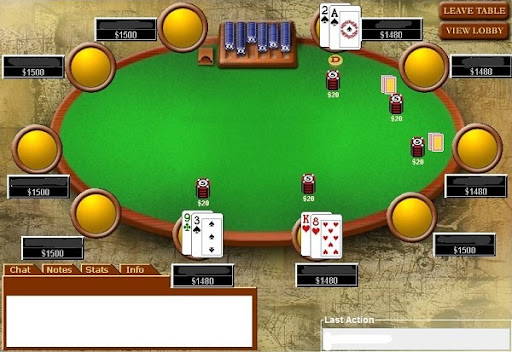
This makes perfect sense, right? I mean, seriously, who wouldn't limp from MP with 93o. You'd have to be crazy not to want to get into the action with a monster like that.

To get things going in the right direction, he connects just a little bit with the board.
I show hand #2 here, not as an illustration of luck, but just to give you a sense of the masterful grasp of tournament Hold'em possessed by our anti-hero.
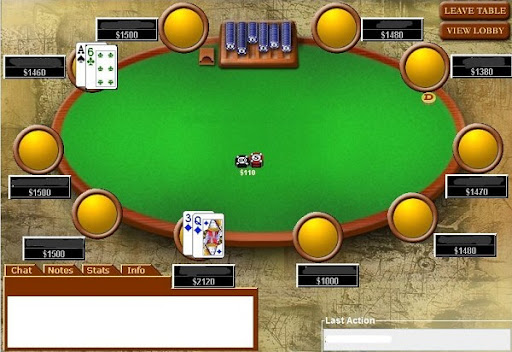
What I missed in the screen capture here is that he did a min-raise with Q3s. The guy with A6o who called the min-raise isn't any smarter, so this should be a fun hand.

We see here that not all the luck ran toward seat 6. The truly amazing thing here is that A6o bet 40 on the flop and 40 again on the turn, each time getting a call from Q3s. On the river A6o bet 100 and got a call. The luckbox apparently felt his Q was good. Or this is really Dennis Rodman. (That's a Celebrity Poker joke, just in case you missed it.)
On to hand #3.
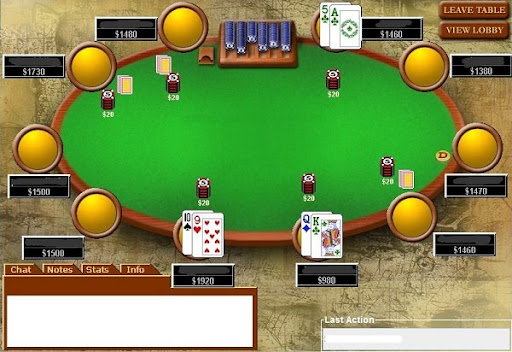
If you can raise with Q3 sooted from UTG+1, it seems only reasonable to call UTG with T9o. The poker gods, of course, clearly favor fools. Wait for it...

Another slight connection with the board. Let's do a quick recap. Three hands. Calls or raises with total trash on all three. Result -- four of a kind, a full house, and one small loss. And we're just getting started.
There's no screen cap of hand #4. Our anti-hero called all the way to the river and then mucked his hand. There was an ace and two kings on the board, so I'm figuring he had a powerhouse like 84o.
Hand #5.
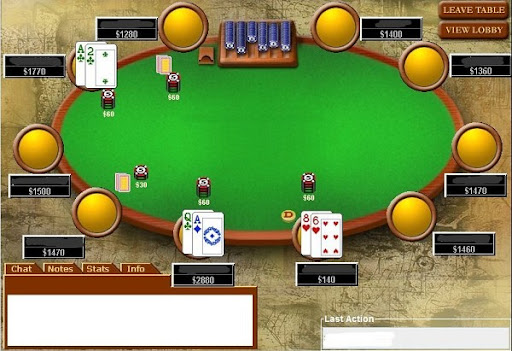
An actual solid starting hand for our luckbox. This doesn't bode well. And it turns out not. Seat #5 pushes all-in on the flop and ends up with two pair. At least the other two in the hand just checked it down after they both completely missed the board.
Hand #6 was rather uneventful. Five to the flop. Check around. Check around again on the turn. Check to our man on the button who puts in a bigger than pot sized bet with four hearts on the board. Everybody folds.
Hand #7 was one of my few decent hands. I had AA and raised to 90. Three callers. The flop was J-high with two diamonds. I bet 330 into a 405 pot. One call from the luckbox. The turn brought my third ace and he finally folded to my bet of about half the pot. I was half hoping he would call.
Hand #8.

As should come as no surprise by now, our guy calls with junk.

And as should come as little further surprise, he connects. What I totally don't get is that he checks here. I realize trying to get inside this guy's head is likely to lead to the same experience Jennifer Lopez's character had in
The Cell, but I still can't help trying. Does he not think top pair is likely good here? Is he slow playing? Is he really Dennis Rodman and actually has no idea what the little symbols on the cards mean?
It gets checked all the way down and the luckbox takes it.
Hand #9.
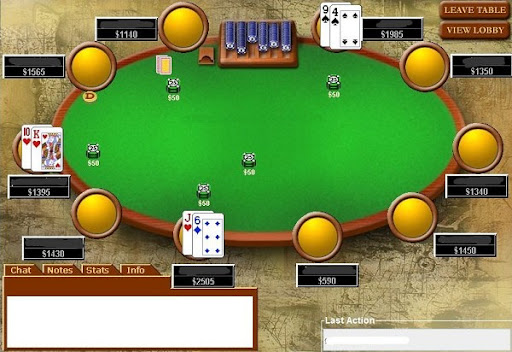
Four players see a flop of K22 with two spades. The cutoff bets 150. In what seemed to be a good move at the time, I called hoping to fill my flush, which would have lead to tragedy. Of course, the luckbox still has two cards, so he calls.
The turn brings an ace and it checks around.
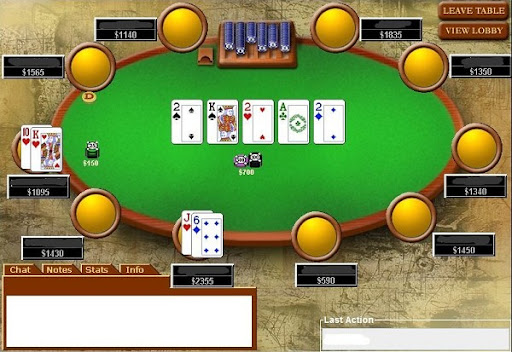
As you can see, the river fills the cutoff's boat. He bets 150. I fold. The luckbox -- I swear he can't have any clue what the little symbols mean -- calls. Seriously, how could you possibly call with J6o on that board? This is why I'm writing this up. The obvious luck involved in this guy lasting more than a couple hands is very rare.
Hand #10. Hold on to your hats. This one's a real doozy.
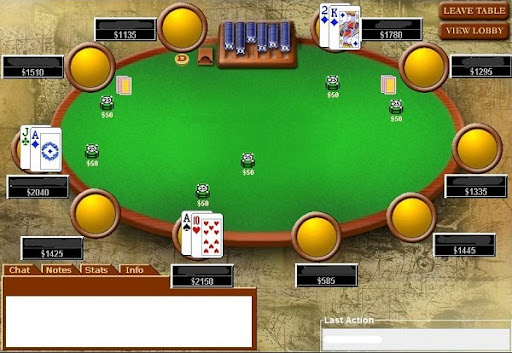
The luckbox actually has a so-so hand this time. Can't fault him for limping. Well, some might argue he should have raised. With the way his luck is running, he's probably a fool for not raising. OTOH, he clearly plays better with junk. Anyway, five players see the flop.

Of course, our guy catches a piece. It checks to the cutoff who makes a pot sized bet. I'm guessing he has a queen and is trying to get rid of any flush draws. Silly wabbit. Hasn't he figured out there's no scaring away the luckbox?
Two folds, two calls. Given how hard I've been on the luckbox, I need to point out seat #8 makes a very stupid call here. At best he's got 7 outs. That makes him about 15% to catch his card on the turn and he's only getting 3:1 from the pot. Dumb call.

You saw this coming, didn't you? The luckbox bets 200 and it gets called around. Seat #8 is getting 9:1 from the pot this time so his call isn't quite so bad, though only if you figure his ace might still be good. Which it isn't.
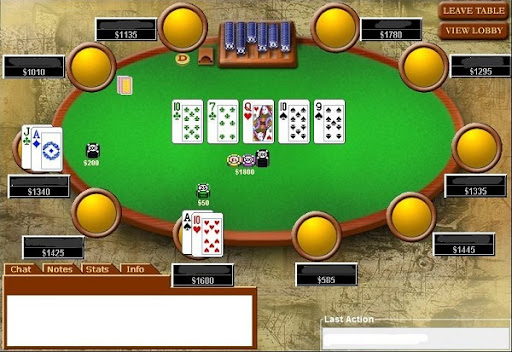
The river doesn't help the luckbox or seat #8 and seems unlikely to have helped the cutoff. Things get really strange here. The luckbox puts out a miniscule bet of 50. It's a ridiculous bet, but what else can we expect? I can only guess that seat #8 thinks his bluff raise to 200 is going to move everyone else off this pot. Not likely.
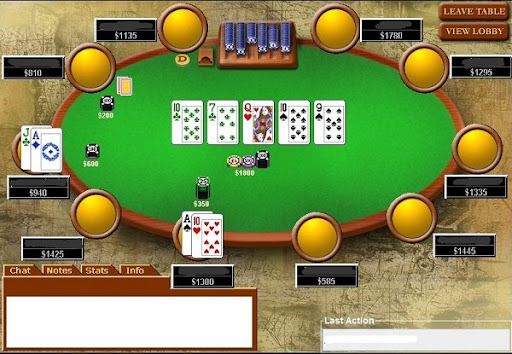
The cutoff calls the bluff raise. We now discover that apparently the luckbox really can read the cards. He makes a teaser raise of 150. Seat #8 continues his folly of half-assed bluffs, this time making it 600 to go. It's unlikely he was ever going to succeed with this bluff, but if he had any chance at all he had to put some real conviction into it. Adding 250 on top of what's already gone into the pot isn't going to scare everyone away.
The cutoff finally realizes his queens aren't any good and he folds. The luckbox calls.
Hand #11.
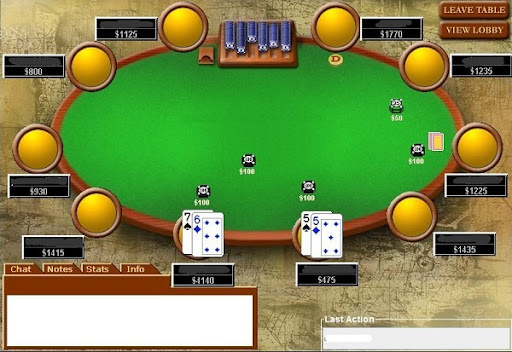
The luckbox has two cards, so he calls. The flop doesn't help anyone so it checks around. The luckbox catches a card on the turn, but either doesn't read his hand right or is afraid someone is being very passive.

The river, naturally, fills his flush and he calls the weak bet from seat #5.
Hand #12 was taken down by the luckbox with an almost pot sized bet on the turn.
Hand #13.

The luckbox gets two cards, and they're sooted, so it's clearly time for a raise. The flop gives seat #5 top pair. Since we need a microscope to find his stack, he pushes. The luckbox, with no hand and no draw, naturally makes the call.
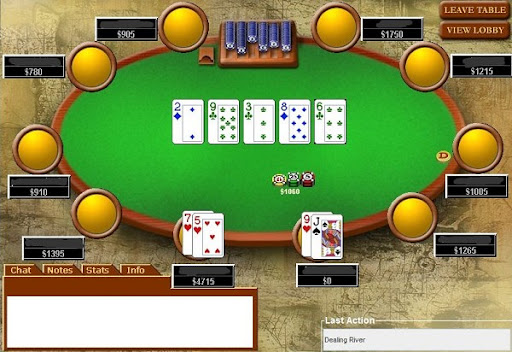
Words fail me here. Perhaps we should all just take a moment and contemplate in silence the awesome power of dumb, idiotic, borderline moronic luck.
Hand #14.

Seat #9, holding AQo, quite properly puts in a raise. I would have pushed right off the bat here considering his stack size, but I guess he was trying to be cautious. The luckbox is holding two cards so he calls.

The luck gets reversed in this hand. Our guy catches a piece of the flop and it completely misses seat #8. Nevertheless, he decides this is a good time to push it all in. As I said, this move would have made a lot more sense before the flop. Now it's kind of stupid. The luckbox has already checked so seat #8 could have seen the turn for free. But he pushes. Of course, our guy has bottom pair so he's not going to be deterred by a pot sized all-in.
Seat #8 lucks out and catches a queen on the river to double up.
Hand #15. Seat #3 and seat #10 both push all-in. Seat #10 takes it with a better kicker and seat #3 is down to crumbs.
Hand #16.

Luckbox has two cards, so he calls. Honestly, the way things are going for him I can't say as I blame him. I'd probably be calling with any two as well.
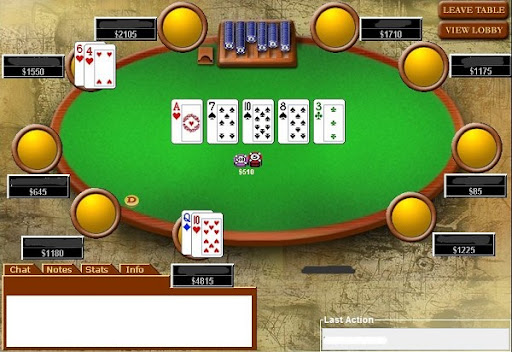
Luckbox again catches on the flop, but doesn't pursue it. They both check it all the way.
Hand #17.
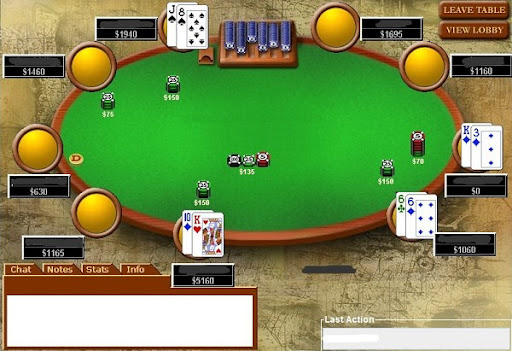
Seat #3 pushes his crumbs into the pot. Seat #4 and the luckbox call, the BB checks.

The luckbox catches a T on the flop and everybody checks it down. Luckbox wins again. Seat #3 hits the rails.
Hand #18.

This one is somewhat uneventful. Luckbox calls with 83o. Who can blame him?
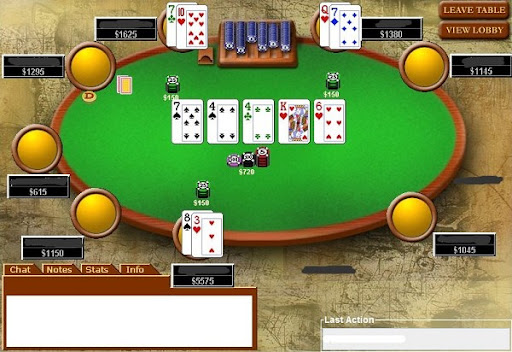
The flop brings seat #10 and I two pair. It checks to the river. Seat #10 puts in a min-bet. I call. Of course the luckbox, with an 8 high, calls. I think a chimpanzee is playing that seat. Seat #10 and I split the pot.
Hand #19, the luckbox raises pre-flop and everyone folds.
Hand #20.

The luckbox and seat #4 go to the turn. Luckbox bets, seat #4 folds. Yawn.
On hand #21 something remarkable happened. The luckbox folded to an all-in from seat #10. Somebody alert the media!
Hand #22.

Seat #8, UTG, pushes all-in for 545. Seat #10 and the luckbox call.

Seat #8 and the luckbox catch the same straight on the turn. Luckbox bets, seat #10 folds. Luckbox and seat #8 split.
Hand #23.
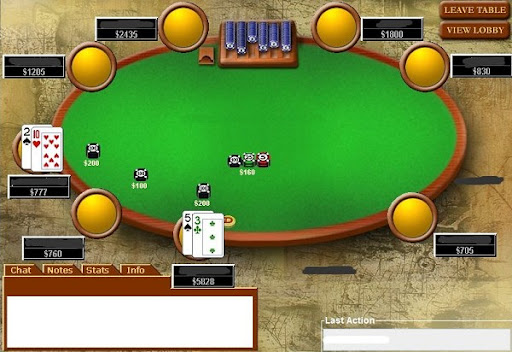
The luckbox, holding the never-to-be-fooled-with 53o, calls from the button. Who wouldn't? It checks all the way to the river.

Who could have possibly doubted? The luckbox bets 200 and seat #8 calls. Stupid call, especially with so few chips left.
Hand #24 is a huge surprise. The luckbox calls an all-in from seat #8 with the luckbox holding the Brunson and the luckbox loses! What is this tournament coming to?
Hand #25 we get back on track. Luckbox call an all-in from seat #4, this time holding A6s. Seat #4 was clearly desperate because he pushed with 98o. The luckbox catches a pair and seat #4 can't quite make his straight.
Hand #26.

This time I wake up with a playable hand. The luckbox calls with two cards and seat #10 calls.

I catch TPTK on the flop and bet a bit over half the pot. The luckbox still has two cards, so he calls. Seat #10 folds.

The turn brings both straight and flush possibilities. I check, knowing that if there's any way I can be beat, I probably am against this opponent. The luckbox checks. This could mean absolutely anything.
The river doesn't improve my hand so I check again. So does the luckbox. Seeing the cards it's obvious I should have bet, particularly since he was almost certain to have called. I take a pot that almost assures victory in this one.
The final hand.

The luckbox actually gets decent cards and limps in. Seat #10 violates a couple basic rules (don't risk chips when you don't need to and don't ever go all-in against the luckbox) and pushes all-in with 99. Seat #2, down to the felt, decides this is as good a time as any to go home and calls all-in. Naturally, the luckbox calls. Three to the flop.

You just knew that was coming, didn't you? Really, what other cards possibly could have fallen. Okay, they could have all been hearts. Short of that, though, this is the only possible outcome with the luckbox in the hand.
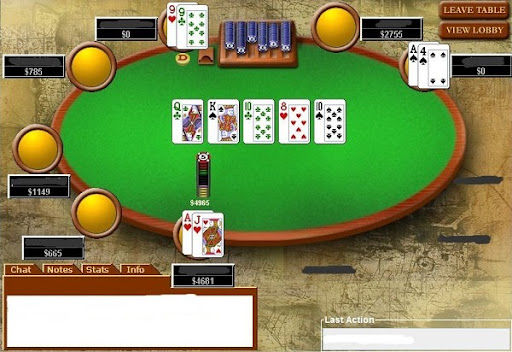
And the magic is finally over. This last hand is one of the few I think he actually played right. Maybe he was just trying to get into the groove.
Let's recap. Twenty-seven hands played. The luckbox bumbles his way to 15 wins and one split. In some ways I suppose the real miracle here is that he didn't piss away his chips on the other ten hands he played to the showdown.
If it wasn't for a few incredibly stupid calls, I'd have to suspect this guy could see not only the other players' cards but the cards that were yet to fall on the board. Maybe he could and the dumb plays were just his way of providing cover. Okay, not likely at a $5 DoN. Still, this is one of the most amazing runs of dumb luck having out over incredibly stupid play I've ever seen. And I've been playing poker a LONG time.








































